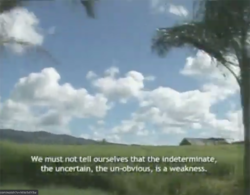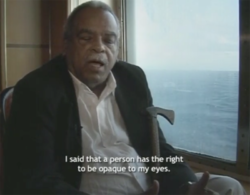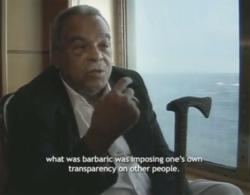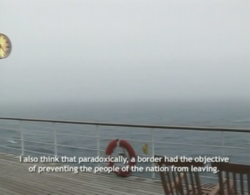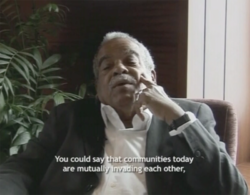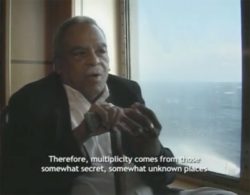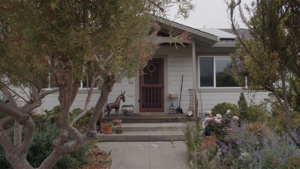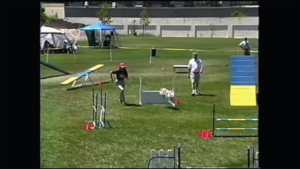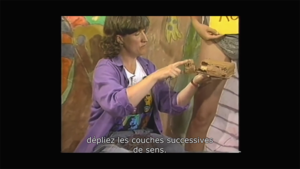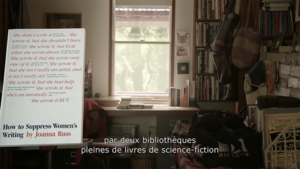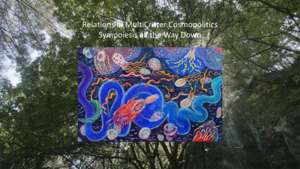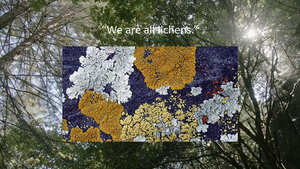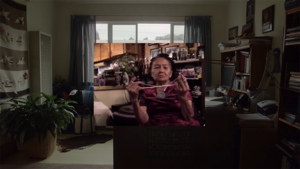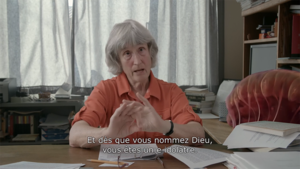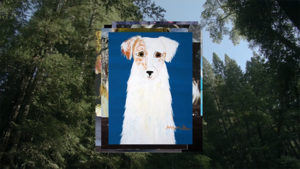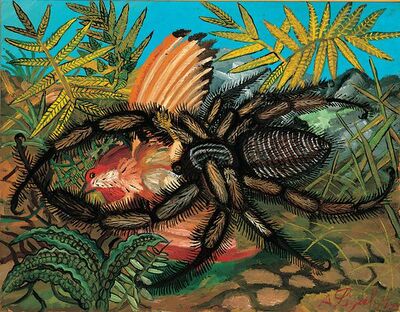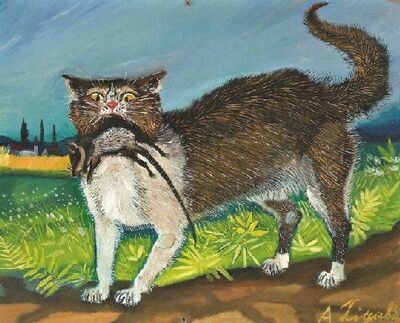User:Annasandri/methods12: Difference between revisions
Annasandri (talk | contribs) No edit summary |
Annasandri (talk | contribs) |
||
| Line 111: | Line 111: | ||
<Given this state of affairs, the question really is not whether feelings such as grief, regret, and despair have a place in transformative politics: it would in fact be impossible to imagine transformative politics without these feelings. Nor is the question how to cultivate hope in the face of despair, since such calls tend to demand the replacement of despair with hope. Rather, the question that faces us is how to make a future backward enough that even the most reluctant among us might want to live there./> | <Given this state of affairs, the question really is not whether feelings such as grief, regret, and despair have a place in transformative politics: it would in fact be impossible to imagine transformative politics without these feelings. Nor is the question how to cultivate hope in the face of despair, since such calls tend to demand the replacement of despair with hope. Rather, the question that faces us is how to make a future backward enough that even the most reluctant among us might want to live there./> | ||
==H̲a̲u̲n̲t̲e̲d̲ L̲a̲n̲d̲s̲c̲a̲p̲e̲s̲ o̲f̲ t̲h̲e̲ A̲n̲t̲h̲r̲o̲p̲o̲c̲e̲n̲e̲ f̲r̲o̲m̲ I̲n̲ A̲r̲t̲s̲ o̲f̲ L̲i̲v̲i̲n̲g̲ o̲n̲ a̲ D̲a̲m̲a̲g̲e̲d̲ P̲l̲a̲n̲e̲t̲ b̲y̲ G̲a̲n̲,̲ E̲l̲a̲i̲n̲e̲,̲ A̲n̲n̲a̲ T̲s̲i̲n̲g̲,̲ H̲e̲a̲t̲h̲e̲r̲ A̲n̲n̲e̲ S̲w̲a̲n̲s̲o̲n̲,̲ a̲n̲d̲ N̲i̲l̲s̲ O̲l̲e̲ B̲u̲b̲a̲n̲d̲t̲== | ==H̲a̲u̲n̲t̲e̲d̲ L̲a̲n̲d̲s̲c̲a̲p̲e̲s̲ o̲f̲ t̲h̲e̲ A̲n̲t̲h̲r̲o̲p̲o̲c̲e̲n̲e̲ f̲r̲o̲m̲ I̲n̲ A̲r̲t̲s̲ o̲f̲ L̲i̲v̲i̲n̲g̲ o̲n̲ a̲ D̲a̲m̲a̲g̲e̲d̲ P̲l̲a̲n̲e̲t̲ b̲y̲ G̲a̲n̲,̲ E̲l̲a̲i̲n̲e̲,̲ A̲n̲n̲a̲ T̲s̲i̲n̲g̲,̲ H̲e̲a̲t̲h̲e̲r̲ A̲n̲n̲e̲ S̲w̲a̲n̲s̲o̲n̲,̲ a̲n̲d̲ N̲i̲l̲s̲ O̲l̲e̲ B̲u̲b̲a̲n̲d̲t̲== | ||
[[File:ligabue1.jpg| | [[File:ligabue1.jpg|400px|left]] | ||
notes:[…]Will they leave only ghosts? Peter Funch, biologist <br> | notes:[…]Will they leave only ghosts? Peter Funch, biologist <br> | ||
anthropocene>”great acceleration”<br> | anthropocene>”great acceleration”<br> | ||
| Line 123: | Line 123: | ||
<The landscapes grown om such endings are our disaster as well as our weedy hope.><br> | <The landscapes grown om such endings are our disaster as well as our weedy hope.><br> | ||
Deborah Bird Rose- “double death”- as extinction which exiinguishes times yet to come.<br> | Deborah Bird Rose- “double death”- as extinction which exiinguishes times yet to come.<br> | ||
[[File:ligabue2.jpg| | [[File:ligabue2.jpg|400px|right]] | ||
Karen Barad- haunted landscapes as strange topologies- ““Every bit of spacetimemattering is … entangled inside all others.”<br> | Karen Barad- haunted landscapes as strange topologies- ““Every bit of spacetimemattering is … entangled inside all others.”<br> | ||
Revision as of 15:58, 1 June 2020
"...Such fear and fanciful notions took possession of the living that almost all of them adopted the same cruel policy, which was entirely to avoid the sick and everything belonging to them. By so doing, each one thought he would secure his own safety.”
“E lasciamo stare che l’uno cittadino l’altro schifasse e quasi niuno vicino avesse dell’altro cura e i parenti insieme rade volte o non mai si visitassero e di lontano: era con sì fatto spavento questa tribulazione entrata ne’ petti degli uomini e delle donne, che l’un fratello l’altro abbandonava e il zio il nipote e la sorella il fratello e spesse volte la donna il suo marito; e (che maggior cosa è e quasi non credibile), li padri e le madri i figliuoli, quasi loro non fossero, di visitare e di servire schifavano.”
Decameron [1349], Giovanni Boccaccio describing the black death
Wikipedia has a pandemics and economic crisis chart. Is nice.
on Covid-19:
►"Is there an erotics of coronavirus?"
►“I’ve come to shut down the machine whose emergency brake you couldn’t find.”
►Vegetable since the pandemic
►Italian major going crazy about people refusing to stay at home with a lo-fi soundtrack here
►Diary of the psycho-deflation
𝕣𝕖𝕒𝕕𝕚𝕟𝕘𝕤 & 𝕧𝕚𝕖𝕨𝕚𝕟𝕘𝕤
Oɴᴇ ᴡᴏʀʟᴅ ɪɴ ʀᴇʟᴀᴛɪᴏɴ- Eᴅᴏᴜᴀʀᴅ Gʟɪssᴀɴᴛ ʙʏ Mᴀɴᴛʜɪᴀ Dɪᴀᴡᴀʀᴀ
rhizome [noun] 1. a rootlike subterranean stem, commonly horizontal in position, that usually produces roots below and sends up shoots progressively from the upper surface; 2. a term used to describe theory and research that allows for multiple, non-hierarchical entry and exit points in data representation and interpretation (Gilles Deleuze and Félix Guattari).
img1 ✸ diaspora
img2 ✸ uncertaincy
img3 ✸ democracy
img4 ✸ opacity
img5 ✸ transparency
img6 ✸ border
img7 ✸ community
img8 ✸ multiplicity
A ɢɪᴀɴᴛ ʙᴜᴍᴘᴛɪᴏᴜs ʟɪᴛᴛᴇʀ- Iɴᴛᴇʀᴠɪᴇᴡ ᴡɪᴛʜ Dᴏɴɴᴀ Hᴀʀᴀᴡᴀʏ
notes:
semiotic materialism is the idea that materialism is always situated meaning-making and never simply representation.
situated knowledges, an effort to think outside the duality of objectivity-relativism
It is not about the opposition between objectivity and relativism, is about the thickness of worlding, is about being for some worlds and not for others
the whole story is about gerunds, -WORLDING -BODYING -EVERYTHING-ING
strategic essentialism (from Gayatri Chakravorty Spivak’s theory)
“there is a strategic use to speaking the same idiom as the people that you are sharing the room with”
the category of PLAY
Play captures a lot of what is going on int his world- there’s a need to develop practices for thinking about those forms of activity that are not caught by functionality, those which propose the possible-but-not-yet, or that which is not-yet but still open.
We can’t do that if we do nothing but critique. We need critique;But is not opening the sense of what might yet be.
Mourning without despair
Pro-tech but skeptical about the Techno-fix: because of their profound immersion in techno capitalism and their disengagement from communities of practise. (solar panels/fracking:is important to be aware of the supply chain that lays underneath technologies like renewable energy.
Sᴛᴏʀʏᴛᴇʟʟɪɴɢ ғᴏʀ ᴇᴀʀᴛʜʟʏ sᴜʀᴠɪᴠᴀʟ-Dᴏᴄᴜᴍᴇɴᴛᴀʀʏ ᴀʙᴏᴜᴛ Dᴏɴɴᴀ Hᴀʀᴀᴡᴀʏ ʙʏ Fᴀʙʀɪᴢɪᴏ Tᴇʀʀᴀɴᴏᴠᴀ
img1 ✸ home
img2 ✸ dog race
img3 ✸ exploring
img4 ✸ cake
img5 ✸ Joanna Russ, feminist science-fiction
img6 ✸ relations
img7 ✸ lichens
img8 ✸ jeu de ficelle
img9 ✸ idolatrie
img10 ✸ dog
Uʀsᴜʟᴀ K. Lᴇ Gᴜɪɴ ᴀɴᴅ Mᴀʀɢᴀʀᴇᴛ Kɪʟʟᴊᴏʏ - Mʏᴛʜᴍᴀᴋᴇʀs & Lᴀᴡʙʀᴇᴀᴋᴇʀs: Aɴᴀʀᴄʜɪsᴛ Wʀɪᴛᴇʀs Oɴ Fɪᴄᴛɪᴏɴ
Eᴠᴇɴᴛᴜᴀʟ ᴄᴏɴsɪsᴛᴇɴᴄʏ-Mɪᴄʜᴀᴇʟ Mᴜʀᴛᴀᴜɢʜ
here
notes:
the etherpad story, a browser collaborative text editor. Wikipedia has a voice Collaborative real-time editor that traces the development.
2008, Etherpad!: complex,but worth reading
two algorithms: Operational transformation OT/ Conflict-free replicated data type
Etherpad documents are based on the concept of CHANGESETS (=list of differences between two successive versions in the repository)- something in common with Wikipedia articles- to store the history of an article.
In etherpad each change in considered a “revision”.
Easysync- merging algorithm < —< Operational transformation
(donna haraway on Diffraction: Diffraction does not produce "the same" displaced, as reflection and refraction do. Diffraction is a mapping of interference, not of replication, reflection, or reproduction. A diffraction pattern does not map where differences appear, but rather maps where the effects of difference appear.)
CRDT model- to surpass OT- Kleepman
shift from speaking of text to speaking of data- information losing its body Katherine Hayles
Technotexts: When a literary work interrogates the inscription technology that produces it, it mobilizes reflexive loops between its imaginative world and the material apparatus embodying that creation as a physical presence. (Writing machines, Katherine Hayles)
NICE!: Your World of Text (2009), Andrew Badr

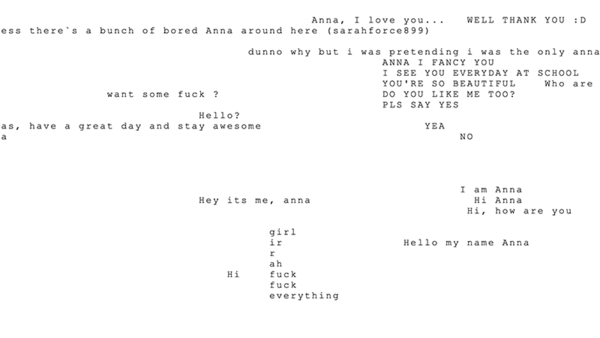
What is an Angel? from Feeling Backward, Heather Love
notes:So far, a simultaneously psychoanalytic and historicist loss—perhaps replacing orsubsuming structuralist lack—has emerged as one of fin de siècle queer theory’s key terms . . . I would like to suggest, however, that this powerful turn toward loss—toward
failure, shame, negativity, grief, and other structures of feeling historical—may also be apremature turn away from a seemingly obsolete politics of pleasure that could, in fact, berenewed by attention to temporal difference. This is, melancholic queer theory may
acquiesce to the idea that pain—either a pain we do feel or a pain we should feel but cannot, or a pain we must laboriously rework into pleasure if we are to have any pleasure at all—is the proper ticket into historical consciousness. Elizabeth Freeman
Bad feelings have a certain prestige in the academic discourse: 1. seriousness;2. long philosophical tradition around negativity. lack>>loss
Connection with a protestant ethic >> “pleasure cannot be the ground of anything productiove at all”
H:
feelings that are not good for action.
Forms of failure that are less closely tied to action
<While feeling bad can result in acting out, being fucked up can also make even the apparentlysimple act of “fucking shit up” seem out of reach.>
—Need to imagine a politics that allows for damage
<Given this state of affairs, the question really is not whether feelings such as grief, regret, and despair have a place in transformative politics: it would in fact be impossible to imagine transformative politics without these feelings. Nor is the question how to cultivate hope in the face of despair, since such calls tend to demand the replacement of despair with hope. Rather, the question that faces us is how to make a future backward enough that even the most reluctant among us might want to live there./>
H̲a̲u̲n̲t̲e̲d̲ L̲a̲n̲d̲s̲c̲a̲p̲e̲s̲ o̲f̲ t̲h̲e̲ A̲n̲t̲h̲r̲o̲p̲o̲c̲e̲n̲e̲ f̲r̲o̲m̲ I̲n̲ A̲r̲t̲s̲ o̲f̲ L̲i̲v̲i̲n̲g̲ o̲n̲ a̲ D̲a̲m̲a̲g̲e̲d̲ P̲l̲a̲n̲e̲t̲ b̲y̲ G̲a̲n̲,̲ E̲l̲a̲i̲n̲e̲,̲ A̲n̲n̲a̲ T̲s̲i̲n̲g̲,̲ H̲e̲a̲t̲h̲e̲r̲ A̲n̲n̲e̲ S̲w̲a̲n̲s̲o̲n̲,̲ a̲n̲d̲ N̲i̲l̲s̲ O̲l̲e̲ B̲u̲b̲a̲n̲d̲t̲
notes:[…]Will they leave only ghosts? Peter Funch, biologist
anthropocene>”great acceleration”
<Ghostsbecome tangible through the form of ancient chestnut stools. Centuries ofgraing, cultivation, trade, taxation, and disease are inscribed onto theirstructure and shape. The landscape emerges om ghostly entanglements:the many histories of life and death that have made these trees, this place>
see where extinction leave traces >where the deads are visible next to the living ones
anthropogenic loss-humans forgetting the landscape as it was before their reshaping: “shifting baseline syndrome”
<Admiring one landscape and its biological entanglements often entails forgetting many others. >
forget, but then ghost will remind us
<Ghosts, too, are weeds that whisper tales of the many pasts and yet-to-comes that surround us. Considered through ghosts and weeds, worlds have ended many times before.>
death: of a forest, of a city, of a friendship, of a leaf, of promises and small stories.
<The landscapes grown om such endings are our disaster as well as our weedy hope.>
Deborah Bird Rose- “double death”- as extinction which exiinguishes times yet to come.
Karen Barad- haunted landscapes as strange topologies- ““Every bit of spacetimemattering is … entangled inside all others.”
Hélène Cixous- ghosts are uncanny-in the anthropocene life persists in the shadow of mass death.
Ladders Are Not the Only Kind of Time
Europe-northerns renassance thinkers claimed that life had evlved from simple to complex- optimistic view that places humans at the top of the grand chain of being- assumed that we were all in a sigle time, all in a single trajectory.
Lichens-symbiotic assemblages of species: filamentous fungi and photosynthetic algae or cyanobacteria- are made of filamentous fungi that are potentially immortal. <When we notice their tempo, rather than impose ours, they open us to the possibility of a different kind of livability> many kinds of time that disturb our conventional sense of time.<These temporal
feats alert us that the time of modernity is not the only kind of time, and that our metronomic synchrony is not the only time that matters.>
Japanese polymath Minakata Kumagusu- rather taht dismissing folk knowledge, he incorporated approaches from it into his scientific work. <This is a reason to learn om ghosts, however unfamiliar their forms. Our experiments combine natural history and vernacular legacies, learning om precedents nourished by other times and places.>
img1,2 ✹ paintings by Antonio Ligabue



